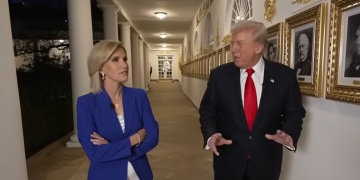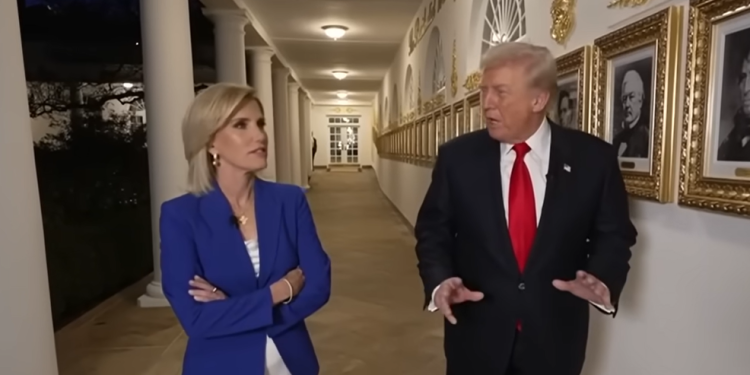President Donald Trump is facing a notable rift within his conservative base following his recent public defense of a plan to allow hundreds of thousands of Chinese nationals to enroll in U.S. universities. Critics argue the policy betrays the “America First” agenda, sparking a debate that has highlighted ideological differences among leading conservative commentators over the role of government control in immigration.
The President confirmed his administration’s plan to issue up to 600,000 student visas to Chinese nationals during an interview with Fox News host Laura Ingraham. This figure would more than double the current enrollment and surpass India as the largest source of international students.
President Trump’s primary defense for the policy was economic: that a sharp reduction in foreign students would be catastrophic for American higher education.
“You don’t want to cut half of the people, half of the students from all over the world that are coming into our country — destroy our entire university and college system — I don’t want to do that,” the President stated. “I actually think it’s good to have outside countries. Look, I want to be able to get along with the world.”
“We do have a lot of people coming in from China,” Trump said. “We also have a massive system of colleges and universities, and if we were to cut that in half… you would have half the colleges in the United States go out of business.”
However, this rationale is being fiercely challenged by security experts who cite systemic espionage by Beijing. Former White House speechwriter Marc Thiessen warned that the policy risks facilitating the “largest and most sophisticated theft of intellectual property and expertise in the history of the world,” citing former FBI Director Christopher Wray. The FBI reports that it has been investigating over 2,000 cases of Chinese intellectual property theft, many involving U.S. colleges and universities.
The risks are underlined by specific cases, including a Chinese researcher at Harvard arrested for attempting to smuggle vials of biological research and a Chinese graduate student convicted of using a drone to take photos of naval bases. The critics emphasize that China’s National Intelligence Law forces all Chinese citizens to cooperate with state intelligence, creating an inherent risk for nationals at U.S. universities.
The policy has exposed a deep ideological chasm, separating those who advocate for the state to enforce national borders from those who fundamentally distrust centralized government control over immigration.
The “America First” contingent, which largely supported the President, voiced a sense of betrayal. Andrew Isker, a prominent figure among Christian Nationalist types, posted a critique on X: “God didn’t spare his life and make him a man of destiny so we could have 600,000 Chinese students propping up failing colleges and millions of H1-Bs indentured slaves for corporations.” This critique frames the policy as a surrender to corporate globalism at the expense of American workers and national community.
By contrast, Luke Saint, President of Future of Christendom and a proponent of Theonomy, views the policy as an inevitable outcome of centralized government power. Saint, who has long argued against the magistrate controlling immigration and opposed the President’s immigration directives as statist overreaches, used the policy as a confirmation of his prior critique. His position suggests that the government cannot be trusted to manage such power responsibly. As he stated in a Facebook post in response to the Chinese visas, “Give the government control of immigration and that’s what they’ll do: control it.” This framing suggests that the disappointing policy is merely the consequence of allowing the state to possess such broad authority in the first place.
The push for 600,000 Chinese student visas stands in contrast to the administration’s own recent policy history, further complicating the messaging.
Earlier this year, the administration had said it was going to “aggressively revoke” Chinese student visas before reversing course. Moreover, the administration is simultaneously imposing new restrictions on high-skilled workers, including a controversial new rule requiring employers to pay a $100,000 fee to sponsor new H-1B visa petitions. This rule, which is already facing a legal challenge from the U.S. Chamber of Commerce, applies to a visa category heavily used by Chinese students seeking to stay in the U.S. after graduation.




























